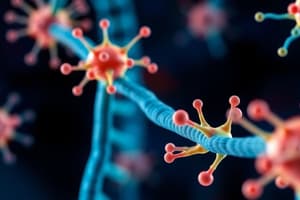Podcast
Questions and Answers
What is the primary purpose of chromatin condensation in gene expression?
What is the primary purpose of chromatin condensation in gene expression?
- To enhance RNA polymerase binding
- To facilitate mRNA processing
- To promote transcription factor assembly
- To inhibit RNA polymerase binding (correct)
Which proteins are responsible for promoting chromatin decondensation?
Which proteins are responsible for promoting chromatin decondensation?
- RNA polymerases
- Activator proteins (correct)
- Repressor proteins
- General transcription factors
How do repressor proteins affect gene expression?
How do repressor proteins affect gene expression?
- They lead to chromatin condensation (correct)
- They promote the transcription of genes
- They compete with activators for binding sites
- They enhance the binding of RNA polymerase
Which statement is true regarding gene expression in eukaryotic cells?
Which statement is true regarding gene expression in eukaryotic cells?
What are the first two steps critical for determining gene expression?
What are the first two steps critical for determining gene expression?
What distinguishes prokaryotic transcription control from eukaryotic transcription control?
What distinguishes prokaryotic transcription control from eukaryotic transcription control?
What does the binding of activator proteins to regulatory DNA sequences do?
What does the binding of activator proteins to regulatory DNA sequences do?
The measurement of RNA produced across various tissues indicates that:
The measurement of RNA produced across various tissues indicates that:
What is the most common level at which eukaryotes control gene expression?
What is the most common level at which eukaryotes control gene expression?
What type of RNA polymerase transcribes protein-coding genes in eukaryotes?
What type of RNA polymerase transcribes protein-coding genes in eukaryotes?
Which eukaryotic RNA polymerase is responsible for the transcription of pre-rRNA?
Which eukaryotic RNA polymerase is responsible for the transcription of pre-rRNA?
What initiates transcription in eukaryotic cells?
What initiates transcription in eukaryotic cells?
Which sequence is NOT considered a transcriptional control region?
Which sequence is NOT considered a transcriptional control region?
What role do transcription factors play in gene expression?
What role do transcription factors play in gene expression?
Which RNA polymerase is involved in the transcription of tRNA?
Which RNA polymerase is involved in the transcription of tRNA?
How many types of RNA polymerases are found in eukaryotes?
How many types of RNA polymerases are found in eukaryotes?
What is the primary function of homodimeric nuclear receptors when they bind to a ligand?
What is the primary function of homodimeric nuclear receptors when they bind to a ligand?
Which of the following statements accurately describes heterodimeric nuclear receptors in the absence of ligands?
Which of the following statements accurately describes heterodimeric nuclear receptors in the absence of ligands?
What characteristic is common among nuclear receptors, regardless of their type?
What characteristic is common among nuclear receptors, regardless of their type?
Which of the following is true about the ligand-receptor complex formed by nuclear receptors?
Which of the following is true about the ligand-receptor complex formed by nuclear receptors?
What is a characteristic feature of the DNA-binding domain of nuclear receptors?
What is a characteristic feature of the DNA-binding domain of nuclear receptors?
What is the primary function of TATA box in gene transcription?
What is the primary function of TATA box in gene transcription?
Which chromatin type is associated with transcriptional inactivity?
Which chromatin type is associated with transcriptional inactivity?
What is the role of distance enhancers in transcription?
What is the role of distance enhancers in transcription?
How do transcription activators primarily exert their effects?
How do transcription activators primarily exert their effects?
What effect does histone acetylation have on chromatin structure?
What effect does histone acetylation have on chromatin structure?
Which of the following is a characteristic of euchromatin?
Which of the following is a characteristic of euchromatin?
What do CpG islands primarily indicate in terms of gene expression?
What do CpG islands primarily indicate in terms of gene expression?
Which statement best describes the function of transcription factors?
Which statement best describes the function of transcription factors?
Flashcards are hidden until you start studying
Study Notes
Transcriptional Control of Gene Expression
- Inactive genes are packaged into condensed chromatin, inhibiting RNA polymerase and general transcription factors needed for transcription initiation.
- Transcriptional control primarily focuses on regulating transcription initiation and elongation, determining gene expression levels and the quantity of mRNA and protein production.
- Activator proteins bind to control elements (both near and distant to the initiation site) to promote chromatin decondensation, enhancing transcription.
- Repressor proteins bind to different control elements, leading to chromatin condensation and inhibiting transcription.
- All cells within an organism share the same genome, but not all genes are expressed in every cell.
- Gene expression levels vary both among cell types and within the same cell at different times.
- Prokaryotes control gene expression primarily at the transcription level due to the absence of mRNA processing.
- Eukaryotes utilize multi-level control, including transcription, RNA processing, translation, and post-translational modification.
- Transcription control is the most common regulatory mechanism in eukaryotes.
- RNA polymerase is responsible for RNA synthesis during transcription, initiating transcription at DNA sequences corresponding to the 5' cap of mRNA.
- Three types of eukaryotic RNA polymerase exist, each specializing in transcribing genes encoding different RNA classes.
- RNA polymerase I located in the nucleolus, transcribes pre-rRNA, which is processed into 28S, 5.8S, and 18S rRNA.
- RNA polymerase II transcribes all protein-coding genes (mRNA) and four of the five small nuclear RNAs involved in RNA splicing (U1, U2, U4, U5) as well as microRNAs (miRNAs).
- RNA polymerase III transcribes genes encoding tRNA, 5S rRNA, and a variety of small stable RNAs including U6 (involved in RNA splicing), and the RNA component of the signal recognition particle (SRP).
- The SRP is involved in directing newly synthesized proteins to the endoplasmic reticulum.
- Prokaryotes have only one type of RNA polymerase, while eukaryotes have three.
- RNA polymerase core subunit structures exhibit extensive similarity across diverse organisms, indicating their early evolutionary origin and conservation.
- Transcriptional control regions include promoters, promoter-proximal elements, and distal enhancers.
- Promoters are DNA sequences specifying RNA polymerase binding sites, initiating transcription, and influencing the transcription rate.
- TATA box: located -25 to -35bp upstream of the start site, the most common type.
- Initiator: alternative promoter element, with less defined boundaries.
- CpG island: found in many constitutive genes, enabling transcription at low rates.
- Promoter-proximal elements play a role in regulating eukaryotic genes.
- Located between 100-200bp upstream of the transcription start site.
- Sometimes, these elements exhibit cell-type specificity.
- Distant enhancers stimulate transcription by RNA polymerase II in eukaryotes, influencing chromatin structure.
- Located far from the transcription start site.
- Acetylation and deacetylation of lysine residues in histone tails influence how tightly DNA is bound by histones, affecting chromatin condensation levels.
- Heterochromatin is densely packed, transcriptionally inactive chromatin, while euchromatin is less condensed, transcriptionally active chromatin.
- Transcription activators and repressors primarily influence the assembly of pre-initiation complexes by modulating chromatin structure (indirect effect) or interacting with RNA polymerase II and general transcription factors (direct effect).
- Multiple DNA-bound activators can cooperate through a single mediator complex, integrating signals from different activators at a single promoter.
- Signals, receptors, and transcription factor activity play crucial roles in regulating transcription.
- Chemical signals commonly alter transcriptional rates, binding to cellular receptors.
- Receptors can be either cell surface receptors (for hydrophilic signal molecules) or nuclear receptors (for hydrophobic signals).
- Small lipid-soluble hormones can readily traverse plasma and nuclear membranes, directly interacting with transcription factors they control, often acting as transcription activators.
- The nuclear receptor superfamily of transcription factors share a common domain structure.
- Variable-length N-terminal region with an activation domain.
- DNA-binding domain with repeated Zn2+ finger motifs.
- C-terminal hormone-binding domain containing a ligand-dependent activation subdomain.
- Homodimeric nuclear receptors are located in the cytosol in the absence of ligands.
- Ligand binding causes the complex to translocate to the nucleus and activate transcription of target genes.
- Example: Glucocorticoid receptor.
- Heterodimeric nuclear receptors reside in the nucleus.
- Examples: Estrogen receptor, Vitamin D receptor, Retinoic acid receptor.
- In the absence of ligands, they bind to their cognate DNA, inducing histone deacetylation and suppressing transcription.
- Ligand binding directs histone hyperacetylation with HAT (unwinding DNA) and stimulates the pre-initiation complex, enabling transcription.
Studying That Suits You
Use AI to generate personalized quizzes and flashcards to suit your learning preferences.



